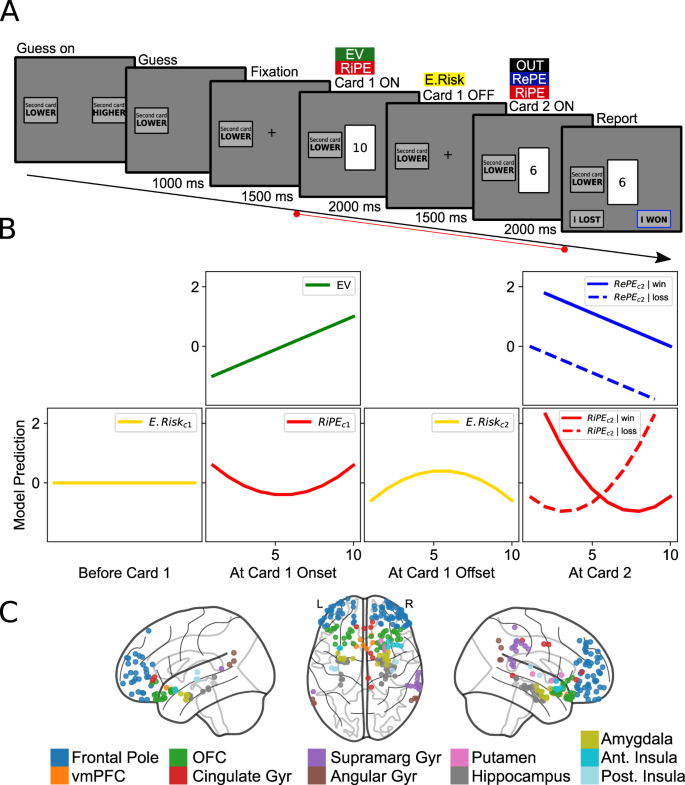2024-03-20 カリフォルニア工科大学(Caltech)
<関連情報>
- https://www.caltech.edu/about/news/when-does-the-brain-process-reward-and-risk
- https://www.nature.com/articles/s41467-024-46094-1
- https://www.jneurosci.org/content/28/11/2745.short
人間の脳における報酬とリスクの時間的組織化表現 Temporally organized representations of reward and risk in the human brain
Vincent Man,Jeffrey Cockburn,Oliver Flouty,Phillip E. Gander,Masahiro Sawada,Christopher K. Kovach,Hiroto Kawasaki,Hiroyuki Oya,Matthew A. Howard III & John P. O’Doherty
Nature Communications Published:09 March 2024
DOI:https://doi.org/10.1038/s41467-024-46094-1

Abstract
The value and uncertainty associated with choice alternatives constitute critical features relevant for decisions. However, the manner in which reward and risk representations are temporally organized in the brain remains elusive. Here we leverage the spatiotemporal precision of intracranial electroencephalography, along with a simple card game designed to elicit the unfolding computation of a set of reward and risk variables, to uncover this temporal organization. Reward outcome representations across wide-spread regions follow a sequential order along the anteroposterior axis of the brain. In contrast, expected value can be decoded from multiple regions at the same time, and error signals in both reward and risk domains reflect a mixture of sequential and parallel encoding. We further highlight the role of the anterior insula in generalizing between reward prediction error and risk prediction error codes. Together our results emphasize the importance of neural dynamics for understanding value-based decisions under uncertainty.
ヒトの島皮質の活性化はリスクと同様にリスク予測の誤りを反映する Human Insula Activation Reflects Risk Prediction Errors As Well As Risk
Kerstin Preuschoff, Steven R. Quartz and Peter Bossaerts
Journal of Neuroscience Published:12 March 2008
DOI: https://doi.org/10.1523/JNEUROSCI.4286-07.2008

Abstract
Understanding how organisms deal with probabilistic stimulus-reward associations has been advanced by a convergence between reinforcement learning models and primate physiology, which demonstrated that the brain encodes a reward prediction error signal. However, organisms must also predict the level of risk associated with reward forecasts, monitor the errors in those risk predictions, and update these in light of new information. Risk prediction serves a dual purpose: (1) to guide choice in risk-sensitive organisms and (2) to modulate learning of uncertain rewards. To date, it is not known whether or how the brain accomplishes risk prediction. Using functional imaging during a simple gambling task in which we constantly changed risk, we show that an early-onset activation in the human insula correlates significantly with risk prediction error and that its time course is consistent with a role in rapid updating. Additionally, we show that activation previously associated with general uncertainty emerges with a delay consistent with a role in risk prediction. The activations correlating with risk prediction and risk prediction errors are the analogy for risk of activations correlating with reward prediction and reward prediction errors for reward expectation. As such, our findings indicate that our understanding of the neural basis of reward anticipation under uncertainty needs to be expanded to include risk prediction.


